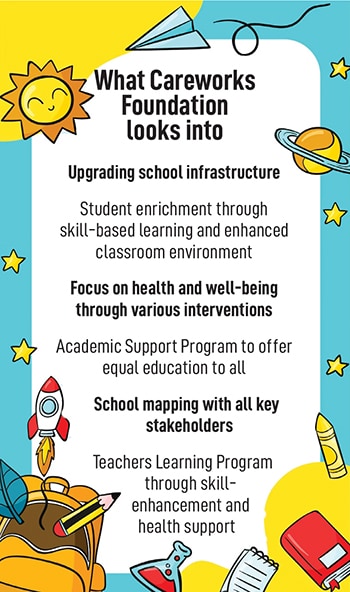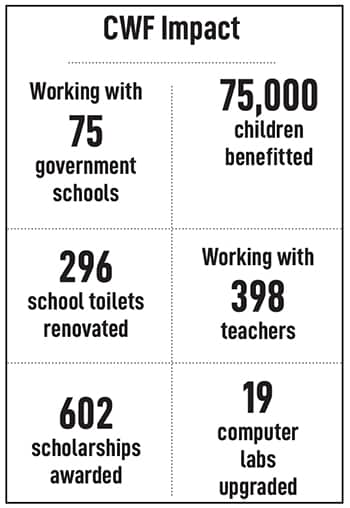Soon after she was hired, when she sat down with Ajit Isaac, chairman, Quess Corp, for a meeting, she recalls, “He gave me a list of 14 goals he hopes to achieve for the Careworks Foundation." The list included everything from programme creation to how to make the model sustainable and replicable. Isaac had a clear vision for the foundation back then, even when it was barely existent, considering it had just been set up. “I still have that piece of paper, and we have crossed six of those goals already," she says with a smile.
On a car ride to Government Higher Primary School Haralur, close to the Quess Corp headquarters in Bengaluru, Srinivas explains how it has taken almost nine years to see a significant impact. “Back then," she says, “he asked me ‘When will these kids go to IITs, IIMs and medical colleges?’ At the time, I would wonder why he’s asking me this when we are working on fixing restrooms at schools. It seemed like an impossible task. But today, I have a student who has joined a medical college."
Isaac’s foresight pushed Srinivas and her team to think of programmes and ideas that they thought were impossible to achieve. Be it the life skill programme for kids who aren’t excelling at studying or the scholarship programme for higher education. “Having someone like him with a vision helped push the foundation in the right direction and think of newer programmes," adds Srinivas. Today, the foundation works with 75 schools in Bengaluru, Shimoga and a few schools in Tamil Nadu.
Ajit Isaac set up Quess Corp in 2007, after spending close to 15 years at various corporates in the human resources sector. It is one of the largest business service providers in India—it provides a host of technology-enabled staffing and managed outsourcing services—with a turnover of ₹9,758 crore in FY22. Isaac is an established entrepreneur now, but giving back has been a part of his life from his childhood days. “When you come from a middle-class household, your wants are defined, and you are not looking at excessive needs. My parents always had a great influence on me, and as a church-going family, I learnt about the principle of tithe—giving back one tenth of annual produce or earnings—very early on. This was an ingrained practice at home," he says.
![]()
Over time, Isaac realised the need to have a structured plan for his philanthropic work. For him, it was key to identify the right cause and then partner with the right organisations to implement them. Two causes he picked were: Health care and education. His belief is that if these two are targeted, entire communities can be uplifted. “In addition to financing, one also had to provide these partner organisations with oversight in terms of how to pace the project, finding resources to commit to it and many others," he says. Hence, the CSR arm of Quess Corp, Careworks Foundation, came about, even as he continued to donate from his own wealth, along with wife Sarah. For the other projects, “We didn’t want to create huge infrastructure to execute them ourselves, having realised we aren’t best equipped," he says.
Careworks Foundation
In any society, there are always pockets of localities where the economically weaker sections live. Some might be daily labourers or small scale entrepreneurs or people who have part-time jobs. All of them send their children to study in local government schools. However, the dropout rate for children before they reach high school is very high. He adds, “With good education, the next generation will be ingrained with the right skills. They will eventually become the future workforce for companies like Quess Corp. So we need to start from scratch."
![]() As CWF started working with schools in Bengaluru, they realised that improving its infrastructure led to an improvement in attendance. “When CWF started working with Government Higher Primary School Haralur in 2017, our total attendance was 170 and today it is 240, per day. There were no clean bathrooms for children, science or computer labs either. Now we have all those facilities and children are quite regular in coming to school," says Sujatha, principal of the school, who only uses her first name. Another school close by had 72 students enrolled, and post CWF’s involvement there are 436 students. Along with infrastructure, the foundation also focusses on teacher training and the health of students, eventually looking at their holistic development. Almost 75,000 children have benefitted from the work that CWF does.
As CWF started working with schools in Bengaluru, they realised that improving its infrastructure led to an improvement in attendance. “When CWF started working with Government Higher Primary School Haralur in 2017, our total attendance was 170 and today it is 240, per day. There were no clean bathrooms for children, science or computer labs either. Now we have all those facilities and children are quite regular in coming to school," says Sujatha, principal of the school, who only uses her first name. Another school close by had 72 students enrolled, and post CWF’s involvement there are 436 students. Along with infrastructure, the foundation also focusses on teacher training and the health of students, eventually looking at their holistic development. Almost 75,000 children have benefitted from the work that CWF does.
“There will always be people on the periphery of society—either by opportunity, health, education or status given at birth. I think the success of society is when we are able to bring everybody from the periphery to the middle. This is what drove the thinking about how do we identify people who are disadvantaged," explains Isaac. According to the EdelGive Hurun India Philanthropy List 2022, Isaac has made a total donation of ₹115 crore.
All these years later, there are close to 70 children who are now going to various colleges for further education, from schools nurtured by CWF. They are also being supported by the foundation as part of their scholarship programme. “Eventually, these kids will become doctors, accountants, engineers, lawyers… exactly what the society needs. If one school performs well, the entire community and area gets lifted up." As the government and other corporates are seeing the impact, CWF is finding more partners wanting to either replicate the model or help out in some way.
Though the foundation has a massive team, how does one ensure that all the 75 schools are following the guidelines given to them? “We have developed something called School Status Monitoring. It is a score card where various programmes are assessed. Based on their performance, we give them a score from 0.5 to 2. This also helps us assign budgets per school," explains Srinivas. Additionally, school mapping is an essential yearly activity, wherein they develop a comprehensive and holistic school development plan along with all stakeholders, including other NGOs that are working at the school. “It helps us understand how well the school is doing in certain aspects and what more they need to do," says Srinivas. At the moment, the plan is to continue expanding their work in Karnataka and Tamil Nadu.
Other Initiatives
Health care is an area that Isaac contributes to out of his personal wealth. The Covid-19 pandemic was an eye-opening experience, where the lacuna in India’s public health system became evident. Says Isaac, “Seeing the situation, I felt that rather than complaining, it was time to actually do something about fixing public health care systems in India." He realised that our investment in public health research and institutional work was not proportionate to the population of India. This led him to collaborate with the research institute, Indian Institute of Science (IISC), to set up a Public Health Education centre. For the same, he has donated ₹105 crore from his personal wealth. “The hope", he says, “is to turn it into India’s premier Centre for Public Health and Policy Research at IISC."
![]() Childcare is another area Isaac feels passionately about. He says, “If you are able to take care of a child’s health from the neonatal stage, it is likely that you will build a healthy population, rather than trying to solve problems later." Isaac’s family, along with Fairfax Financial Holdings and Quess Corp, have invested about ₹300 crore to set up a paediatric specialty centre with 300 beds at Christian Medical College, Vellore. The centre is expected to be ready in the next three years and will have 26 sub-specialisations.
Childcare is another area Isaac feels passionately about. He says, “If you are able to take care of a child’s health from the neonatal stage, it is likely that you will build a healthy population, rather than trying to solve problems later." Isaac’s family, along with Fairfax Financial Holdings and Quess Corp, have invested about ₹300 crore to set up a paediatric specialty centre with 300 beds at Christian Medical College, Vellore. The centre is expected to be ready in the next three years and will have 26 sub-specialisations.
His family has also contributed in setting up the geriatric care centre at St John’s Hospital in Bengaluru. Isaac and Sarah also support non-profit organisation Guardians of Dreams Foundation that works with children who grow up in Child Care Institutions (CCIs) such as orphanages and adoption centres. The organisation has mapped over 350 CCIs across Bengaluru, Chennai and Ernakulam. Isaac has been providing funding of ₹8-9 crore for its Capacity Accelerator Program, which aims to transform CCIs. “These existing institutions are given a certain score by the foundation. Those who score well are given a grant. In this process, these CCIs get much better infrastructure," he says. “Shortlisted CCIs are being evaluated by Guardians of Dreams. The final five CCIs will be the test beds and the eventual outcome will be much better infrastructure and care quality."
Additionally, they are planning to work with Sports and Society Accelerator (SSA) to come up with a ‘State of Play’ report to understand India’s sports infrastructure.
Palliative care is also an area that is close to Isaac’s heart. After his mother passed away due to cancer, they had additional morphine bottles that they then donated to palliative care centres. “When I spoke to these centres, I realised how expensive care for cancer patients ends up being. Keeping that in mind, we are setting up a palliative care centre in Tumakuru [in Karnataka] for the underprivileged," he adds. Through all these initiatives, Isaac prefers taking a slightly off-beat path. “We want to do something different, partner with the best and create long-term impact," he says.
Isaac targets giving close to half of his total wealth back, ₹20-30 crore every year, across initiatives. However, going beyond writing a cheque and making an impact on ground is tough, for various reasons. Be it health care or education, Isaac’s foundation works closely with the government. “Often, people lack an understanding of why giving back is important. For instance, children today are usually boxed in the urban maze, and aren’t really exposed to ground realities. What we don’t realise is that these experiences lead to a lasting impact for the rest of their lives," he says. Eventually, this could lead to a lack of empathy.
![]()
Indian society is one that has historically seen shortages. “Public memory doesn’t fade away very easily, so one tends to hoard and can’t give away easily because of the shortage mindset," he explains. However, Isaac strongly believes companies and individuals shouldn’t be forced to give back. Instead of mandatory CSR spending, policymakers need to incentivise organisations if they give back, via tax rebates for instance.
The 55-year-old’s criteria when it comes to deciding what to fund are the people running the organisations and the issues they are trying to solve. In doing the same, how does he separate the philanthropist from the entrepreneur in him? “First let’s look at the similarities between the two. You want to align with people who can be trusted and in both cases you will look for returns—either economic or social impact," he explains. In terms of differences, “As an entrepreneur you keep things time-bound, if a certain plan doesn’t work out, it can be shut down. But with social issues, you have to give it time and be cognisant of external factors."
Isaac has been giving back in some form or the other since 1997. “Over the years," he believes, “I’ve learnt that life is transient, and you are a trustee of the resources you get. You use as much as you need from it, and the rest should be used for common good."

 Over time, Isaac realised the need to have a structured plan for his philanthropic work. For him, it was key to identify the right cause and then partner with the right organisations to implement them. Two causes he picked were: Health care and education. His belief is that if these two are targeted, entire communities can be uplifted. “In addition to financing, one also had to provide these partner organisations with oversight in terms of how to pace the project, finding resources to commit to it and many others," he says. Hence, the CSR arm of Quess Corp, Careworks Foundation, came about, even as he continued to donate from his own wealth, along with wife Sarah. For the other projects, “We didn’t want to create huge infrastructure to execute them ourselves, having realised we aren’t best equipped," he says.
Over time, Isaac realised the need to have a structured plan for his philanthropic work. For him, it was key to identify the right cause and then partner with the right organisations to implement them. Two causes he picked were: Health care and education. His belief is that if these two are targeted, entire communities can be uplifted. “In addition to financing, one also had to provide these partner organisations with oversight in terms of how to pace the project, finding resources to commit to it and many others," he says. Hence, the CSR arm of Quess Corp, Careworks Foundation, came about, even as he continued to donate from his own wealth, along with wife Sarah. For the other projects, “We didn’t want to create huge infrastructure to execute them ourselves, having realised we aren’t best equipped," he says. As CWF started working with schools in Bengaluru, they realised that improving its infrastructure led to an improvement in attendance. “When CWF started working with Government Higher Primary School Haralur in 2017, our total attendance was 170 and today it is 240, per day. There were no clean bathrooms for children, science or computer labs either. Now we have all those facilities and children are quite regular in coming to school," says Sujatha, principal of the school, who only uses her first name. Another school close by had 72 students enrolled, and post CWF’s involvement there are 436 students. Along with infrastructure, the foundation also focusses on teacher training and the health of students, eventually looking at their holistic development. Almost 75,000 children have benefitted from the work that CWF does.
As CWF started working with schools in Bengaluru, they realised that improving its infrastructure led to an improvement in attendance. “When CWF started working with Government Higher Primary School Haralur in 2017, our total attendance was 170 and today it is 240, per day. There were no clean bathrooms for children, science or computer labs either. Now we have all those facilities and children are quite regular in coming to school," says Sujatha, principal of the school, who only uses her first name. Another school close by had 72 students enrolled, and post CWF’s involvement there are 436 students. Along with infrastructure, the foundation also focusses on teacher training and the health of students, eventually looking at their holistic development. Almost 75,000 children have benefitted from the work that CWF does. Childcare is another area Isaac feels passionately about. He says, “If you are able to take care of a child’s health from the neonatal stage, it is likely that you will build a healthy population, rather than trying to solve problems later." Isaac’s family, along with Fairfax Financial Holdings and Quess Corp, have invested about ₹300 crore to set up a paediatric specialty centre with 300 beds at Christian Medical College, Vellore. The centre is expected to be ready in the next three years and will have 26 sub-specialisations.
Childcare is another area Isaac feels passionately about. He says, “If you are able to take care of a child’s health from the neonatal stage, it is likely that you will build a healthy population, rather than trying to solve problems later." Isaac’s family, along with Fairfax Financial Holdings and Quess Corp, have invested about ₹300 crore to set up a paediatric specialty centre with 300 beds at Christian Medical College, Vellore. The centre is expected to be ready in the next three years and will have 26 sub-specialisations.